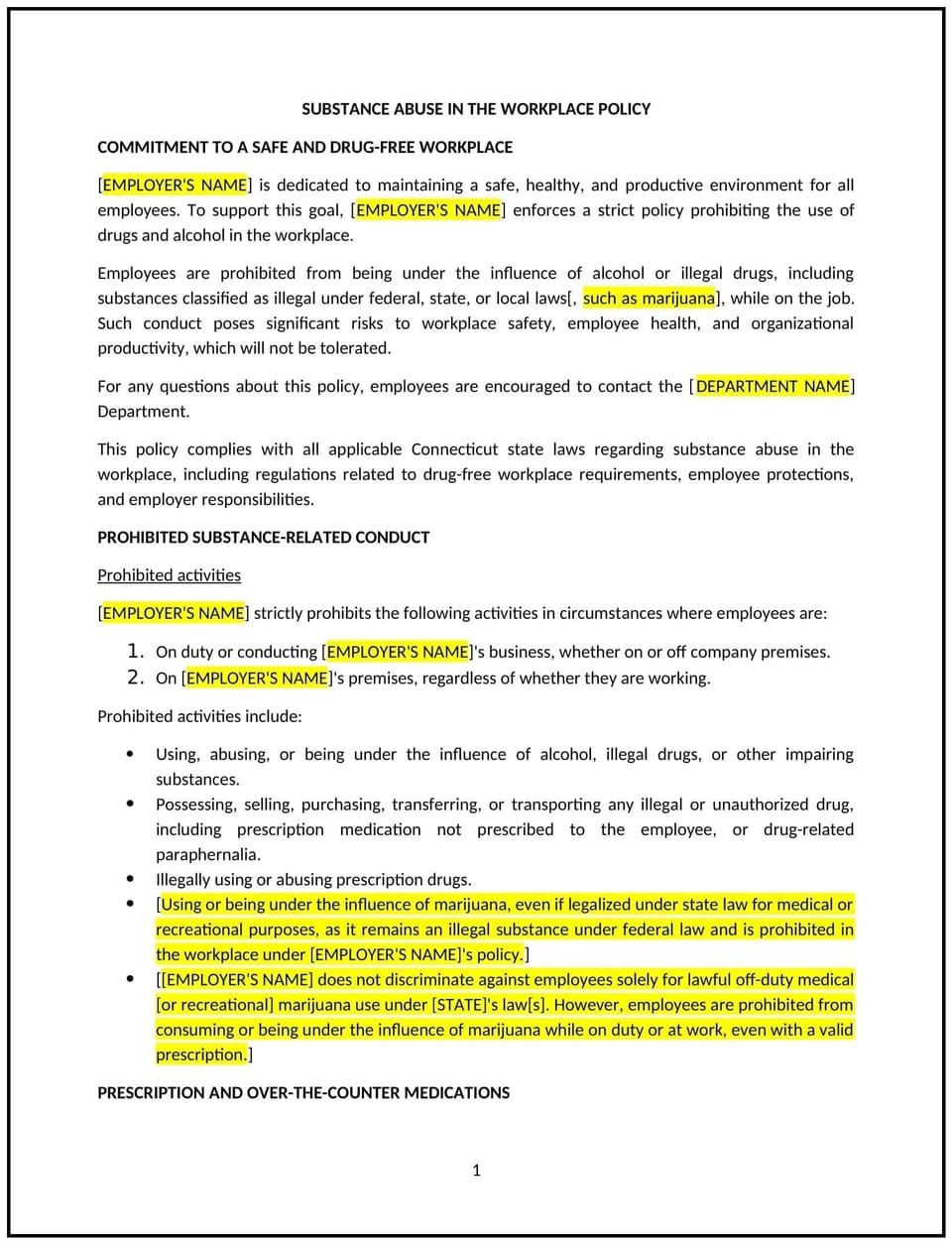Substance abuse in the workplace policy (Connecticut): Free template

Substance abuse in the workplace policy (Connecticut)
A substance abuse in the workplace policy helps Connecticut businesses maintain a safe, healthy, and productive work environment by addressing issues related to alcohol and drug use. This policy outlines the company’s commitment to preventing substance abuse, providing support for employees who are struggling with substance-related issues, and setting clear expectations and consequences for violations.
By implementing this policy, businesses can minimize workplace accidents, ensure compliance with laws, and promote employee well-being while fostering a productive and supportive workplace culture.
How to use this substance abuse in the workplace policy (Connecticut)
- Define substance abuse: Clearly define what constitutes substance abuse, including the use of illegal drugs, misuse of prescription medication, and alcohol use during work hours or on company premises.
- Prohibit substance abuse at work: State that the use, possession, distribution, or impairment caused by alcohol or drugs during work hours or on company property is prohibited.
- Set expectations for behavior: Explain the company’s expectations regarding employee behavior, including the requirement that employees remain free from substance impairment while performing job duties.
- Provide support and resources: Offer support for employees who may be struggling with substance abuse, including access to counseling, employee assistance programs (EAPs), or rehabilitation resources.
- Outline testing procedures: Specify any substance testing procedures, including when testing will be required (e.g., after an accident, during random testing, or as a condition of employment), and the process for handling test results.
- Address consequences for violations: Detail the disciplinary actions that may be taken if the policy is violated, which could range from warnings to termination, depending on the severity of the violation.
- Comply with laws: Ensure that the policy complies with relevant state and federal laws, including Connecticut’s laws on medical marijuana, and addresses any legal requirements related to drug and alcohol testing in the workplace.
Benefits of using this substance abuse in the workplace policy (Connecticut)
This policy offers several benefits for Connecticut businesses:
- Promotes a safe and healthy work environment: By addressing substance abuse, the policy helps reduce the risk of accidents, injuries, and health problems caused by impairment in the workplace.
- Supports employee well-being: The policy offers support and resources to employees struggling with substance abuse, helping them access the assistance they need to recover and continue being productive at work.
- Enhances productivity: Employees who are free from substance abuse issues are more likely to be focused, engaged, and productive, improving overall business performance.
- Ensures compliance with laws: By following state and federal guidelines, the policy helps the business comply with regulations surrounding substance use, testing, and employee rights.
- Reduces legal risks: A clear and consistent policy reduces the risk of lawsuits, claims of discrimination, or wrongful termination related to substance abuse issues, and ensures fair treatment of all employees.
Tips for using this substance abuse in the workplace policy (Connecticut)
- Communicate the policy clearly: Ensure all employees understand the policy, including the types of substances prohibited, the consequences for violations, and the available support for those struggling with substance abuse.
- Provide training: Offer regular training on substance abuse awareness, including how to recognize signs of impairment and how to access available resources, such as EAP programs.
- Offer support for employees: Make sure employees know about available resources, including counseling and rehabilitation programs, and ensure they feel comfortable seeking help without fear of judgment or retaliation.
- Monitor and enforce consistently: Ensure that the policy is enforced consistently across the organization, with clear guidelines for how violations will be handled.
- Review periodically: Update the policy regularly to reflect changes in Connecticut laws, such as those related to medical marijuana, and to address emerging substance-related issues in the workplace.
Q: How does this policy benefit my business?
A: The policy ensures a safe and healthy work environment by addressing substance abuse issues, promoting employee well-being, and reducing the risk of accidents and legal liabilities. It also supports employees struggling with substance issues by providing resources and assistance.
Q: What is considered substance abuse under this policy?
A: Substance abuse includes the use, possession, or distribution of illegal drugs, misuse of prescription drugs, or alcohol use during work hours or on company property that impairs an employee’s ability to perform their job safely and effectively.
Q: Will employees be tested for substance abuse?
A: Employees may be subject to substance testing as outlined in the policy, which could include testing after accidents, random testing, or as part of the hiring process. The policy should clearly explain when and how testing will occur.
Q: What should an employee do if they are struggling with substance abuse?
A: The policy should encourage employees to seek help through available resources, such as employee assistance programs (EAPs) or rehabilitation services. Employees should be assured that they will not face retaliation for seeking help.
Q: How often should this policy be reviewed?
A: The policy should be reviewed annually or whenever there are updates to Connecticut laws, federal regulations, or changes in company practices to ensure it remains relevant, effective, and compliant.
This article contains general legal information and does not contain legal advice. Cobrief is not a law firm or a substitute for an attorney or law firm. The law is complex and changes often. For legal advice, please ask a lawyer.


